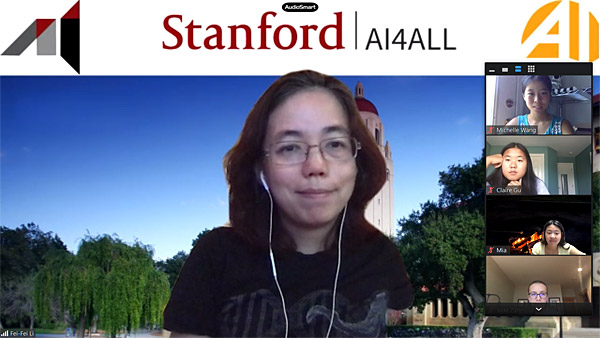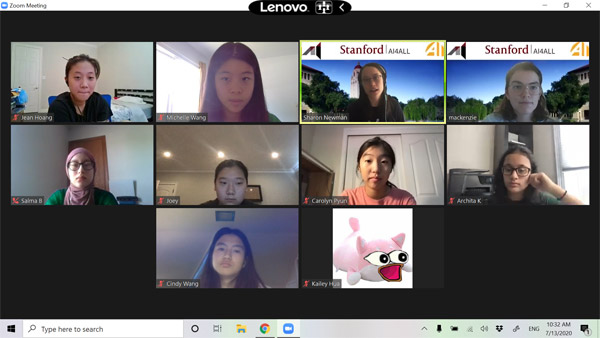Michelle Wang has been attending the AI4ALL course at Stanford University via Zoom sessions this summer. “The first week of Stanford AI4ALL has been amazing! I have learned so much about AI, its impact and applications. I have also met many amazing students from around the world,” Michelle exclaims!
“The biggest part of the camp is the research project. I’m in the computational biology group with 7 other girls from around the U.S. Our project is focused on using Machine Learning (ML)/Artificial Intelligence (AI) to detect cancerous RNA sequences in a RNA microarray. We have not yet started on it as we are still covering basics of ML and Python. Our mentors are Stanford PhD students and they are both super knowledgeable and engaging,” Michelle adds.
In the first week, Michelle says she learned about a basic neural network’s structure, execution, and evaluation, data and bias, a bit of biology, and AI and its societal impact. After class, students work on python notebooks in breakout rooms. Homework is assigned each night ranging from assigned reading to more coding challenges, where students may explore and learn.
“One of my favorite homework assignments was when we were told to use Teachable Machine, a “no-coding-required” AI system, to train our own network and tweak it to try for better results. I decided to go outside and take pictures of different types of trees for it to identify. I ended up taking 500+ pictures (what would we do without burst mode?) for a moderate dataset. The network ended up working pretty well, but I realized that it was mostly analyzing the angle of the shot, not the actual tree. This assignment showed me that AI can be really easy to use, but there are often many unforeseen challenges involved. This week, we mostly talked about AI conceptually, but I’m really excited for next week where we will really dig in to the math and use python to program AI algorithms,” Michelle explains.
Students have two one-hour faculty talks everyday presented by Stanford researchers who discuss their various fields of research and include elements of AI. Afterward, students have an opportunity to ask questions. In the first week, they covered a wide variety of topics: drug development, structural biology, haptic devices, robots, AI in hospitals, and using computer vision to help solve global issues like poverty and hunger.
“My favorite presentation was by a Stanford professor who led the Ocean One project. Ocean One is a humanoid robot that can dive in the ocean and go much farther than a human. They used this robot to go and retrieve treasure from very old shipwrecks. He showed us videos of the robot swimming around the ship, and he also showed the vase that the robot retrieved. It was truly inspiring to see all of these diverse applications of AI,” Michelle reports.
Students also had an opportunity to chat with Professor Fei-Fei Li. “She is one of the co-founders of AI4ALL and is also one of the most influential AI researchers in the world. She talked about her research in computer vision as well as her bumpy path to AI. We asked her lots of questions! It was really inspiring to talk to such a prominent researcher that we could all somewhat relate to,” Michelle adds.
To promote community building, students participate in scheduled social time sessions that do not include a speaker, organized activities like online games, or breakout rooms. They also meet during breaks and over the weekend to socialize and complete assigned homework.
“AI4ALL is really into “community building” which is hard when the programs are online. However, I’ve still met many interesting people from all around the world. The day before the camp started, we had a welcome session—which was basically just a lot of introductions. There are 32 campers. A lot of people are from California, but there are people from many other states as well as places like Hong Kong, the UK, New Zealand, Romania, India, and Qatar. Some of them have to get up at 1:30 AM! A lot of us have common interests besides computer science,” Michelle explains.
Michelle reports that her second week at AI4ALL has been great! “I have learned a lot more about the technical side of AI and statistics. This past week, I learned about correlation, regression, K-nearest-neighbors, and K-means algorithms. We also applied these techniques to our gene profile dataset. Some of them worked really well, while others were not as good. I think I am developing a better understanding of AI, especially when applied to a dataset similar to the gene expression profiles we are using,” Michelle explains.
“This week’s faculty talks were also very interesting. Once again, they covered a huge range of topics including medical image analysis, AI in aircraft, computer graphics, and robotics. I really enjoyed the presentation about AI in aircraft. The speaker developed an aircraft safety system that has been used in ALL commercial jets since 2018! His explanations of reinforcement learning were really fascinating since we did not have too much instruction on that topic,” Michelle adds.
In addition, students also attended several special panels such as a “Women in AI” panel and an “AI4ALL Alumni” panel comprised of college and high school students respectively. “It was really cool to see how the college students got into AI and research. I learned a lot from their diverse experiences. The AI4ALL alums stressed the importance of getting involved in your own community after the program. I was really impressed with their creative ideas. Both panels were very inspiring and enjoyable. I also got to know some more of my classmates better this week,” Michelle reports.
In the final week of the program, students refined their algorithms, then presented their findings.
>> Read Michelle’s Final Report (PDF file, 72 KB).
>> Learn about other students’ experiences in the GFF Scholarship Program.



